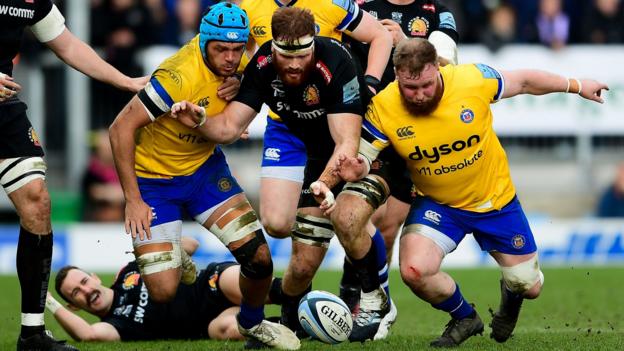
Premiership clubs are working towards a best-case scenario of returning to action on the weekend of 3-5 July and are accepting of playing midweek games, BBC Sport understands.
The latest plans to resume the season involve a full month of training before the first match and would build to a final, ideally at Twickenham if it is available, on 15 August.
However, these plans rely on social distancing guidelines easing, and access to coronavirus tests and emergency services for all involved in putting on training and matches being supported by the government.
Premiership Rugby sources said that they were not interested in "buying testing via private routes" and would "never take resources away from the public needs".
The dates that are being worked towards at present would involve several midweek games. That is understood to have the approval of BT Sport and the clubs, who are keen to complete the season after it was suspended in March because of the coronavirus pandemic.
Each game would be televised.
Clubs have also discussed different possibilities for where to stage matches in what will be a condensed schedule.
Although Twickenham could be used as a neutral venue or a venue for multiple fixtures, and has the necessary medical facilities and pitch quality, clubs have acknowledged this plan will fall down if London is kept in lockdown for longer than elsewhere.
Twickenham is also currently being used as a drive-through coronavirus testing centre.
It is understood that no formal conversations have taken place between PRL and the Rugby Football Union, but there is an openness for talks.
There could also be a double-header fixture of the Premiership final and the Premiership Rugby Cup final if the teams are different.
However, one source suggested that the contact nature of rugby, the handling of the ball and the presence of bodily fluids like saliva and blood could mean that rugby takes longer to return than other sports.
During a recent World Health Organization webinar, the director of medicine at the NBA said: "There are certain things that are going to be very difficult.
"For example, in the sport of basketball, what about the basketball itself? How well can we disinfect the basketball? As soon as it comes back into play, people are handling it."
Premiership Rugby bosses have been in regular contact with the government about drawing up a protocol that helps sport return safely without impacting NHS needs.
The preference is for a unified position for all sport to follow.
Rugby's return-to-play protocol has been agreed with the Rugby Players Association, and is largely in line with that produced by World Rugby.
It involves two weeks of individual training and four weeks of impact training before the first match.















 Phone: (800) 737. 6040
Phone: (800) 737. 6040 Fax: (800) 825 5558
Fax: (800) 825 5558 Website:
Website:  Email:
Email: 






